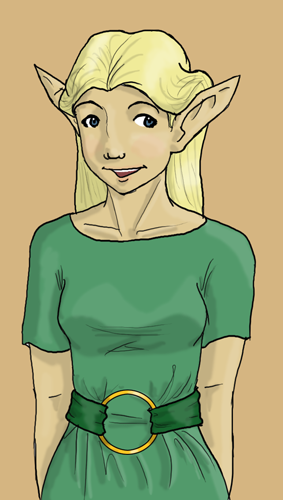





|
Wizardry
Wizardry is a versatile form of Elcenian magic. Spells usually consist of two or three components. All spells include a gesture (which represents the number of units of magical power used) and a word or phrase (which identifies the spell or spell family, and is chosen by the spell's inventor). Most spells also include an "intentional component", in which the correct functioning of the spell depends on its caster holding a detail about its planned result clearly in his or her mind. (Spells which lack intentional components can only do very simple things, and are usually called "one-trick spells".) Some advanced spells also require or can benefit from physical foci or written diagrams. While the practice of wizardry differs from place to place in what spells are popular, how it is taught, and what it is used for, there are three basic traditions of wizardry, each of which uses a different array of gestures to represent quantities of magical power and includes a completely different set of spells extant: standard terrestrial, fey, and marine. Humanoid species use the first, fey (fairies and pixies) use the second, and merfolk use the third. (Merfolk and humanoids can use each other's gestures, but developed their dominant sets independently; pixies and fairies have four arms and rely on this to make their gestures.) Magical power for wizard spells is drawn from a reservoir (accessible only from Elcenia, not from other worlds, although spells cast in Elcenia may affect other worlds). How much magical power it is possible for a given person to draw depends on their channeling capacity (CC), which can be detected magically. The average CC for all native-born Elcenian sapients is on the order of 350, but different species, regions, and families may have higher or lower averages. All sapients in Elcenia have CCs, but some cannot cast spells because they cannot make sufficiently complex gestures (e.g. wolves) or speak spell phrases (e.g. sprites). Casting spells that require more than half of one's CC is painful, with the level of discomfort increasing with the percentage of CC used. Wizards can increase their CCs by acquiring familiars. Familiars begin as ordinary animals, and are then attached to their wizard via a complex spell. They do not age, cannot reproduce, and can be summoned to the wizard's location - even transworld - by the wizard adopting a specific posture chosen during the attachment procedure. Familiars are not sapient, but are generally docile towards their wizards and people the wizard interacts with civilly. The average CC boost from acquiring a familiar is 40 CC, but it varies; some species of animals produce better results for some species of wizards (e.g. dragon wizards tend to get more extra CC from drake familiars). Death or injury to a familiar is damaging and dangerous to its wizard; death of a wizard invariably kills his or her familiar. Spells can accomplish almost any task they are designed for (with the notable exceptions of raising the dead, perfectly predicting the future, or doing anything that cannot be precisely specified by the inventor or caster). They are divided into the following categories:
It is possible for two or more casters to share the channeling requirements of some spells, casting together. If it is a static spell, either of them can reverse it independently (in fact, this is the only way to reverse a spell); the spell will also end if only one of them dies. Spells that are cast in this way are dramatically more difficult to break than single-caster spells. A majority of places in which wizardry is taught organize the material into ten "tiers", and governments cooperate to organize hazardous spells into various categories and ban wizards-in-training who have not completed the requisite tier of education from casting those spells without permission from a more completely trained wizard. A wizard who completes all ten tiers is simply a wizard. It is often possible to receive licenses to cast specific advanced spells without learning any other magic.
|


